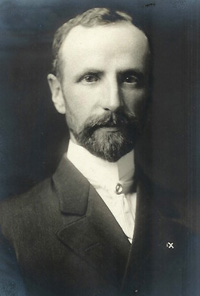As the story goes, Kentucky native and U.S. Supreme Court Justice Fred M. Vinson was chatting with a colleague who was on his way to Louisville for a meeting of the state bar association. Upon arrival, Vinson instructed him, he should find the man who “looks, talks, and acts most like a judge.” That man would be John B. Rodes of Bowling Green, to whom Vinson wished to convey his best regards.
The long and distinguished career of John Barret Rodes (1870-1970) included not only service as a lawyer and judge, but as mayor of Bowling Green from 1930-1934, president of the Kentucky State Bar Association from 1940-1941, member of the WKU Board of Regents from 1944-1948 (he is the “Rodes” in Rodes-Harlin Hall), and leadership in many civic organizations and causes.
In 1897, however, John Rodes was just a giddy young man in love. Writing to 21-year-old Elizabeth Davis Hines–“my sweetheart”–he couldn’t hide his feelings for the woman who would soon become his wife. But he also harbored a little of the natural dignity that Justice Vinson would praise so many years later. Rodes wrote Elizabeth that he must forgo the pleasure of calling on her that evening because an illness had left him not only “wrapped in salves, liniments and bandages” but unable to wear a collar–“a very little thing & yet a very large important thing for it is indispensable in calling to see you. In fact,” Rodes declared, “when I come to see you I cannot do without a collar.” With this simple rule to help him avoid any uneasiness about his appearance, Rodes concluded that “my collar shall always be easy and my burden light”–a misquotation of Scripture, he observed, that made him “devilish good.”
John and Elizabeth Rodes’s letters are part of the Rodes Collection in the Manuscripts & Folklife Archives section of WKU’s Department of Library Special Collections. Click here to download a finding aid. For more collections relating to the Rodes and Hines families, search TopSCHOLAR and KenCat.

